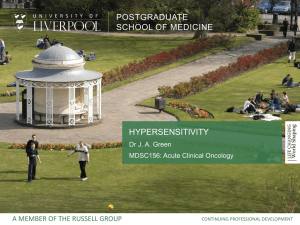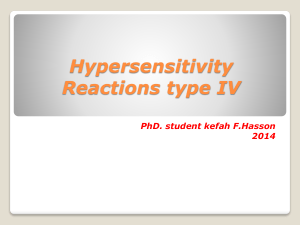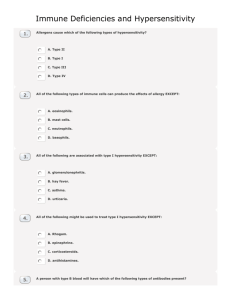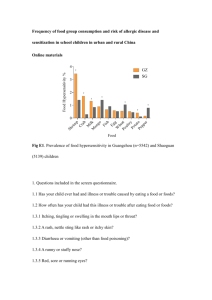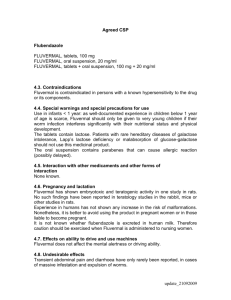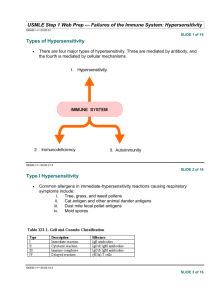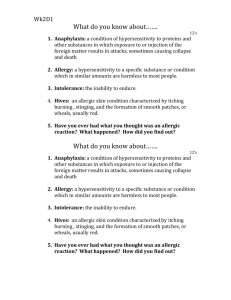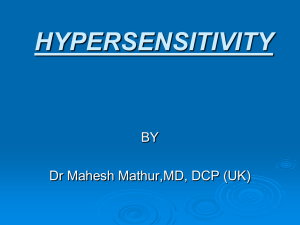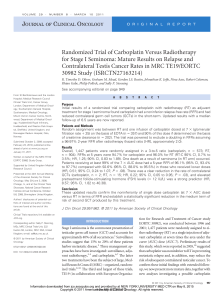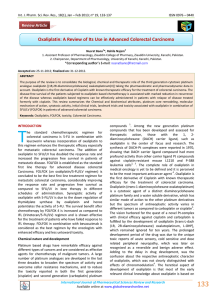management of hypersensitivity reactions to platinum
advertisement
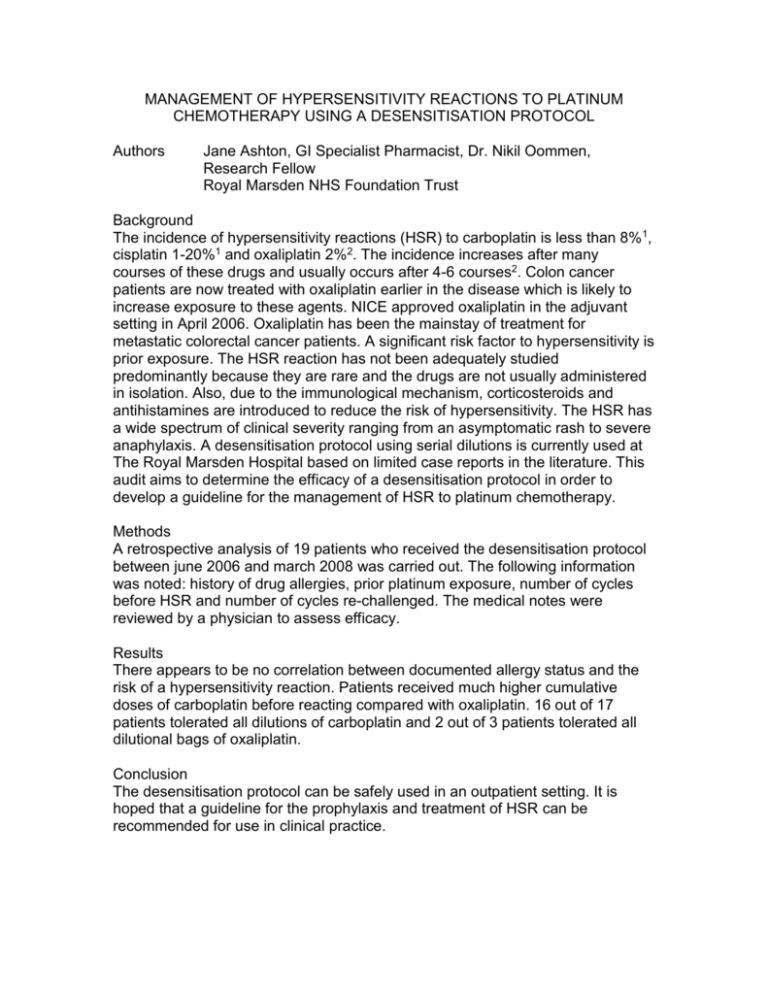
MANAGEMENT OF HYPERSENSITIVITY REACTIONS TO PLATINUM CHEMOTHERAPY USING A DESENSITISATION PROTOCOL Authors Jane Ashton, GI Specialist Pharmacist, Dr. Nikil Oommen, Research Fellow Royal Marsden NHS Foundation Trust Background The incidence of hypersensitivity reactions (HSR) to carboplatin is less than 8%1, cisplatin 1-20%1 and oxaliplatin 2%2. The incidence increases after many courses of these drugs and usually occurs after 4-6 courses2. Colon cancer patients are now treated with oxaliplatin earlier in the disease which is likely to increase exposure to these agents. NICE approved oxaliplatin in the adjuvant setting in April 2006. Oxaliplatin has been the mainstay of treatment for metastatic colorectal cancer patients. A significant risk factor to hypersensitivity is prior exposure. The HSR reaction has not been adequately studied predominantly because they are rare and the drugs are not usually administered in isolation. Also, due to the immunological mechanism, corticosteroids and antihistamines are introduced to reduce the risk of hypersensitivity. The HSR has a wide spectrum of clinical severity ranging from an asymptomatic rash to severe anaphylaxis. A desensitisation protocol using serial dilutions is currently used at The Royal Marsden Hospital based on limited case reports in the literature. This audit aims to determine the efficacy of a desensitisation protocol in order to develop a guideline for the management of HSR to platinum chemotherapy. Methods A retrospective analysis of 19 patients who received the desensitisation protocol between june 2006 and march 2008 was carried out. The following information was noted: history of drug allergies, prior platinum exposure, number of cycles before HSR and number of cycles re-challenged. The medical notes were reviewed by a physician to assess efficacy. Results There appears to be no correlation between documented allergy status and the risk of a hypersensitivity reaction. Patients received much higher cumulative doses of carboplatin before reacting compared with oxaliplatin. 16 out of 17 patients tolerated all dilutions of carboplatin and 2 out of 3 patients tolerated all dilutional bags of oxaliplatin. Conclusion The desensitisation protocol can be safely used in an outpatient setting. It is hoped that a guideline for the prophylaxis and treatment of HSR can be recommended for use in clinical practice. References 1. Davil Gonzalez, I et al., Hypersensitivity reactions to chemotherapy drugs. Review article. Alergol Immunol Clin 2000; 15:161-181 2. Gammon et al., Hypersensitivity Reactions to Oxaliplatin and the application of a desensitisation protocol. The Oncologist 2004; 9:546-549 3. Meyer, L et al., Hypersensitivity Reactions to Oxaliplatin: Cross reactivity to carboplatin and the introduction of a desensitisation schedule. Journal of Clinical Oncology Vol 20, Issue 4, 2002: 1146-1147 4. Garufi, C et al., Skin testing and hypersensitivity reactions to oxaliplatin. Annals of Oncology 2003, 14:497-498 5. Goldberg et al., Anaphylaxis to cisplatin: diagnosis and value of pretreatment in prevention of allergic reactions. Annals of Allergy, vol 73, September 1994,271-2 6. Confino-Cohen, R et al., Successful Carboplatin desensitisation in patients with proven carboplatin allergy. Cancer August 1, 2005, Vol 104, Number 3, 640-3 7. R. Jones et al., Carboplatin hypersensitivity reactions: re-treatment with cisplatin desensitisation Gynecologic Oncology 89 (2003) 112-115 8. Goldberg et al., A modified, prolonged desensitisation protocol in carboplatin allergy. J Allergy Clin Immunol 1996 Vol 98, Number 4, 841-3 9. Hendrick et al., Allergic reactions to carboplatin. Annals of Oncology 1992; 3: 239-240 10. Saunders et al., Hypersensitivity reactions to cisplatin and carboplatin – A report on six cases. Annals of Oncolgy 1992; 3:574-576 11. Markman et al., Expanded experience with an intradermal skin tests to predict for the presence or absence of carboplatin hypersensitivity. J Clin Oncol, 2003. 21 (24): 4611-4 12. Kitada et al. Case report. Oxaliplatin-induced hypersensitivity reaction displaying marked elevation of immunoglobulin E. J Oncol Pharm Practice, 2007. 13:233-235 13. www.ctc.toxicity version 3.0 14. Personal communication with Sanofi-Aventis. 15. Martindale, The Complete Drug Reference. 35th Edition 16. New EPOC trial protocol. Version 6. 16 January 2008 MANAGEMENT OF HYPERSENSITIVITY REACTIONS TO CHEMOTHERAPY USING A DESENSITISATION PROTOCOL Jane Ashton, GI Specialist Pharmacist Royal Marsden NHS Foundation Trust Downs Road, Sutton, Surrey. SM2 5PT Tel: 0208 642 6011 x 1356 Email: jane.ashton@rmh.nhs.uk PLATINUM
